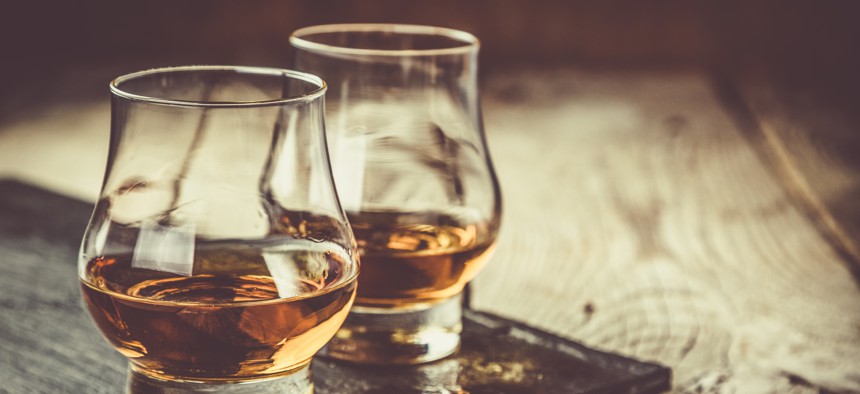The States With the Stiffest Liquor Taxes

istock.com/a_namenko
Washington has the highest excise tax rate on distilled spirits ($35.31 per gallon) while New Hampshire and Wyoming have the lowest rates (less than $1), according to the Tax Foundation.
Of all alcoholic beverages that are taxed by states and local governments, distilled spirits—such as gin, rum, whiskey, bourbon and vodka—have the stiffest tax rates because they have higher alcohol contents than wine, beer and other alcoholic beverages. The Tax Foundation reviewed distilled spirit taxes for all 50 states and Washington D.C. and found a wide range of levels.
Washington state by far has the highest excise tax rate on distilled spirits ($35.31 per gallon), followed by Oregon ($21.95), Virginia ($19.89), Alabama ($19.11) and Utah ($15.92), the Tax Foundation found.
Distilled spirits are taxed the least in Wyoming and New Hampshire—less than $1 per gallon. These two states receive revenue from alcohol sales at government-run stores and “set prices low enough that they are comparable to buying spirits without taxes,” according to the foundation's report.
Other states that have low taxes on spirits are Missouri ($2 per gallon), Colorado ($2.28), Texas ($2.40) and Kansas ($2.50).
Like many excise taxes, the ones on distilled spirits vary widely across states. The rates may include a wholesale tax rate converted to a gallonage excise tax rate; case and/or bottle fees, which can vary based on container size; retail and distributor license fees that are converted to a gallonage excise tax rate; and additional sales taxes.
Distilled spirits tax rates also may differ within states according to alcohol content, place of production or location purchased, including onboard an airplane, the Tax Foundation said.
Total U.S. excise tax revenue from all alcoholic beverages was $10 billion in 2019, or 10% of states' total excise receipts, according to the Tax Policy Center.
The Tax Foundation used data from the Distilled Spirits Council of the United States for its analysis. To allow for comparability across states, the council calculated implied excise tax rates for states with government monopoly sales.
For more information from this report click here.
Jean Dimeo is managing editor for Route Fifty.
NEXT STORY: Why Managing Billions in Federal Aid for Small Towns Will be a Huge Lift





